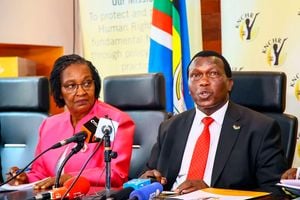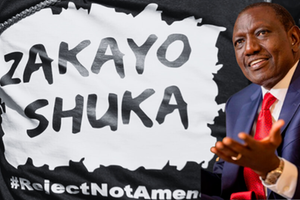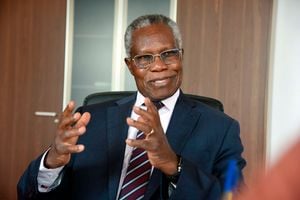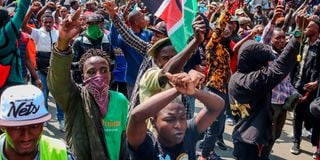
Anti-government protesters march along Moi Avenue in Nairobi on July 23, 2024.
“Mr Speaker Sir!"
This powerful declaration rang out in Kenya's Parliament on June 25, 2024, setting the stage for the unprecedented withdrawal of an ambitious tax plan and the dissolution of the Cabinet.
The pronouncement with far-reaching political implications was not made by a veteran politician, but by a Gen-Z hero, who boldly took the Speaker's seat, representing the frustrations and hopes of a generation tired of corruption, poor leadership, and political manipulation.
It marked the culmination of Kenya’s largest-ever youth-led protest against the controversial Finance Bill 2024, and preceded a series of actions by President William Ruto that have since radically altered the country’s political landscape and are likely to have a bearing in the 2027 polls.
Apart from the withdrawal of the Finance Bill, 2024 and the dissolution of the Cabinet, it led to the creation of the broad-based government that saw five ODM politicians co-opted in the Cabinet.
Although the impeachment of former Deputy President Rigathi Gachagua has no direct link with the Gen-Z protests, it was facilitated by the incorporation of ODM in Kenya Kwanza administration. ODM numbers in Parliament guaranteed his ouster.
The protests have changed Kenya's social fabric, the place of politicians in organising protests, the profile of a protester and street demonstrations, the idea of governance and social activism, but most importantly, the place of the economy, taxation and public debt in public discourse, in what experts now say is the beginning of a renaissance at the level - or higher - of the independence struggle and the second liberation movement that ushered in multi-partyism and a new constitution.
Outrage
Across the country, hundreds of thousands of young people united in their outrage, with the epicentre of the movement erupting in Nairobi—and going as big as in 38 of Kenya’s 47 counties.
Human rights activist Boniface Mwangi, who was repeatedly arrested during the protests, believes the movement left a profound mark.
“One of the things that Kenyans realised is that they have the power,” he says. “The June protests were a wake-up call for the entire country —that all sovereign power belongs to the people.”
Mr Mwangi sees an awakening.
The appetite for civic engagement, he notes, has grown. Kenyans have turned social media platforms into tools for civic education, breaking down complex issues like the Finance Bill into local languages and mobilising communities.
“Every Kenyan with access to information has become a civic educator,” he says.
But there are red flags.
Activist Mwangi highlights the government’s suppression of social media, including the shutdown of Telegram during the recent national examinations. He views it as an attempt to stifle information flow, an ominous sign for freedoms hard-won.
June protests
“Kenya has changed forever,” he adds, optimistic that the seeds sown by the June protests will bear fruit in time.
There is also the abductions nightmare—82 people snatched by armed, hooded men, seven just in December, and 29 still missing—with a furore across the country for action.
Inspector General of Police Douglas Kanja and Directorate of Criminal Investigations boss Mohamed Amin have both denied their officers’ involvement in the abductions—to the chagrin of the Law Society of Kenya President Faith Odhiambo, Narc Kenya leader Martha Karua, and civil society activists, who have all demanded the duo’s resignations.
Political analyst Javas Bigambo echoes Mr Mwangi’s sentiment, describing the protests as an “uninvited political phenomenon” that placed the youth at the centre of national politics.
“The younger generation intruded into the political space with an intensity previously unseen,” he explains. “This was a political accident with long-term consequences for governance in Kenya.”
Mr Bigambo predicts that the youth, emboldened and engaged, will play a pivotal role in the 2027 General Election, breaking away from traditional voting patterns.
“Ignoring the youth will come at a great cost,” he warns.
Human rights activist Bob Njagi calls it “a first in Kenya’s history and a significant win for the people.” “The protests have redefined activism.”
“Activists have become the new opposition, holding the government accountable and demanding transparency.”
However, he warns that public participation in governance remains flawed due to unclear thresholds in the constitution.
Civil society groups like the Kenya Human Rights Commission (KHRC) highlight the lack of accountability for rights violations during the protests.
Executive Director Davis Malombe notes: “Justice remains elusive for the victims and their families. This pattern of systemic injustices has perpetuated a culture of impunity.”
Despite the repression, Mr Malombe finds hope in the renewed spirit of resistance: “Kenyans have claimed their sovereign power. The protests reignited our political spirit, and we will continue to push for the upholding of constitutional rights without fear or favour. Aluta continua.”
Back to June 25.
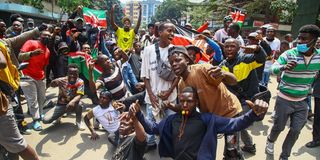
Youthful demonstrators match along Kimathi Street, Nairobi during the anti-government protests on July 23, 2024.
On this day, just after 2pm, protesters stormed Parliament in a historic act of defiance.
While lives were lost in the violent clashes, the youth of Kenya made their voices heard in a way that couldn't be ignored.
Hardly anyone predicted that 2024 would be the year of accountability in Kenya’s political space, sometimes using methods that could be considered unusual. Through means that are legal and others that the authorities say border on harassment; mobile phone numbers of those in authority were shared publicly, leaders are being booed or walked out on, with online tools being created to hold those in authority accountable.
Budget documents, government expenditures and the lifestyle of those in power have become under sharp scrutiny more than ever before, with the public questioning the sources of income of those displaying flashy lifestyles.
Raphael Obonyo, a public policy analyst and convener of The Youth Congress (TYC), remarked: "June 25, 2024, was a turning point—it showed that true power rests with the people."
The uprising was more than a protest—it was a bold statement of the youth's power to redefine the nation's political and economic future.
Mr Obonyo highlighted that the Gen Z movement demonstrated the youth, as the largest voting bloc, are not passive observers but key agents of change.
Judy Oricho, a human rights advocate and regional director at the US Institute for Diplomacy and Human Rights, highlights the transformative impact of Gen Z protests in Kenya.
“Kenya should be ready for the emergence of a new generation of educated, tech-savvy leaders committed to inclusivity and unity, breaking away from traditional ethnic, gender, and religious divides,” said Ms Oricho.
In his 2015 book, Conversations About Youth in Kenya, Mr Obonyo recognises the vast potential of the youth, urging national and county governments to prioritise them as Kenya’s greatest asset.
Founded in 2007 to support youth-focused political campaigns, TYC - a national NGO – has worked to increase youth involvement in governance and development.
He stressed: “Excluding young people from leadership deprives society of their ideas, energy, and talent—vital for progress. The 2024 Gen Z protests showed that Kenya can no longer overlook its youth.”
Daniel Adikha, a youth leader from Likuyani, Kakamega County pointed out that past governments have treated youth issues with shallow, reactive solutions instead of enacting real, lasting change.

Youth hold peaceful protests along Kenyatta Avenue in Nakuru town.
Mr Adikha explained: “Successive regimes have merely patched up youth issues with quick fixes instead of real solutions.”
The recent Gen Z protests acted as a wake-up call, urging the government, counties, parastatals, and private institutions to reconsider their approach to young people and create genuine platforms for their voices.
Before the protests, youth were excluded from political and economic discussions, Mr Adikha stated. He pointed out that they were only taken seriously during elections, they were seen as the swing vote.
The National Council for Population and Development (NCPD) reports that over 80 per cent of Kenya's population is under the age of 35, reflecting a global trend of a youthful population. In Kenya, youth are defined as individuals between the ages of 18 and 34.
Madzao Rocha Ndegwa, a fifth-year civil engineering student at the University of Nairobi and president of the University of Nairobi Students Association, likened the situation of Kenyan youth before the Gen Z protests to a boiling bubble that has been building over the years.
Rising unemployment and escalating corruption have worsened the already tough socio-economic conditions, becoming unbearable for the public, Mr Ndegwa, 24, explained.
“The agitation remains. That it is time for the government to listen,” he said.
The protests, which were organic and issue-driven, underscored Kenyans' demand for good governance, accountability, and respect for human rights, noted Ms Oricho.
Similarly, Wanjira Wanjiru, co-founder of the Mathare Social Justice Centre (MSJC), underscored the youth’s rejection of deceitful, ethnic-based politics, highlighting that the struggles of young Kenyans transcend tribal boundaries.
Ms Wanjiru emphasised the resilience and determination of oppressed Kenyans, particularly the youth, who came together during the Gen Z protests to defend their sovereignty against corruption and exploitative policies by the International Monetary Fund (IMF) and World Bank.
“A key lesson for the country is to never underestimate the power of a people who have been oppressed when they come together to defend their sovereignty. Prior to the Gen Z protests, the political class had become extremely corrupt – they still are.”
Both former President Uhuru Kenyatta and President William Ruto have acknowledged the scale of the problem, with Kenya reportedly losing billions of shillings daily to graft.
In particular, Ms Wanjiru called for people-centric leadership to replace the current political class, whom she criticised for perpetuating poverty, poor governance, and human rights violations, including police brutality during the protests.
The Gen Z movement also pushed for greater accountability, with young people analysing government operations and demanding transparency in matters of public interest, such as procurements, appointments, and governance processes.
A central demand of the movement was economic inclusion. In the protests against the #FinanceBill2024, the youth was clear that Parliament should listen to the people, not the Executive, Adikha said.
Stephen Irungu, a coordinator of the TYC youth league in Mt Kenya, voiced concerns over the government's taxation and youth empowerment policies.
While the suspension of the Finance Bill 2024 after widespread Gen Z protests was seen as a temporary win, Mr Irungu cautioned that other taxes have been quietly implemented, fueling frustration among young people.
Looking toward the 2027 elections, Mr Irungu stressed that the youth will no longer remain passive. “It won’t be business as usual. Young people will support any political formation or leader who shares their values of good governance and economic growth.”
Mr Irungu stressed that youth want an economy that offers them job opportunities and fair wages, not empty promises or high taxes. He criticised the government's approach to youth unemployment, particularly the "questionable job opportunities abroad," stating that Kenya's educated youth should build their own country.
MSJC has been raising political awareness through community dialogues and reggae sessions to engage youth in informal settlements.
Ms Wanjiru highlighted the importance of unity and organisation in strengthening youth constituencies to form a powerful force for the 2027 elections, ensuring leadership that prioritises Kenya's sovereignty and the welfare of its people.
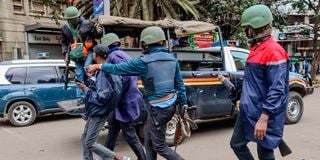
Police officers arrest a protester on Kenyatta Avenue in Nairobi during anti-Finance Bill protests on June 27, 2024.
Ms Wanjiru explained that Gen Z’s hesitation to return to the streets after June 25 was largely due to a lack of organisation and leadership.
“While the approach was effective at the time, we are now learning the importance of uniting youth constituencies in informal settlements like Kibra, Mathare, Dandora, Mukuru, and Kayole. Once united, we must make collective decisions on the future direction of Kenya.”
She emphasised: “We reject neo-colonialism, US-backed puppet leadership, and retrogressive policies in sectors like agriculture. We want a fully sovereign, patriotic Kenyan state, and we are ready to be on the frontlines.”
The era of political complacency is over.
“To the political class: It is no longer business as usual. Parliament must uphold its representative mandate and stop being a rubber stamp for the executive. Elected leaders must deliver or be sent packing,” cautioned Mr Irungu.
Kenya should anticipate a significant shift in the 2027 elections, with more young people obtaining IDs, registering as voters, and running for leadership roles, Ms Oricho noted.
She emphasised Gen Z's ability to mobilise effectively using technology, bypassing the need for heavily-funded political campaigns, which have historically dominated Kenyan politics.
Similarly, Thalma Marita, a policy and governance expert and executive director at the Youth Leaders Stakeholders organisation in Kakamega County, anticipates heightened political awareness among youth leading up to the 2027 elections.
Gen Z protests
Historically sidelined, the youth have begun asserting themselves, as seen in the Gen Z protests against the Finance Bill 2023, observed Ms Marita. More young people are becoming informed about legislative processes and are demanding accountability and transparency in governance, she noted.
“Unlike in 2022, when voter apathy was prevalent, 2027 is expected to see higher youth voter turnout, with decisions based on merit and progressive policies rather than empty promises,” Ms Marita noted.
Looking ahead to the 2027 general elections, Mr Adikha believes the power of the youth will play a decisive role. “Kenya cannot underestimate the Gen Z movement, which is growing stronger every day. Leaders who fail to deliver won’t have it easy.”
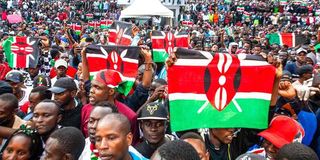
Participants during the Shujaaz Memorial concert held on July 7, 2024 at Uhuru Park in Nairobi.
Mr Madzao advises the political class to be ready to battle it out with youthful voters and youthful competitors in 2027, as Ms Marita predicts a more peaceful, pragmatic election period, driven by young leaders stepping into political roles and championing inclusive policies. “The youth, no longer content with delegating power to older generations, are poised to take a central role in shaping Kenya’s political future, marking a shift from being passive participants to key decision-makers,” she expressed.
Mr Obonyo reminded leaders of the 2010 Constitution’s preamble: “We The People.” He argued that Kenyans, neither the executive, legislature, nor judiciary, are the true custodians of the Constitution.
Mr Obonyo emphasised, "The judiciary must maintain its independence and address issues of public concern. It should provide guidance to Kenyans, especially when the executive and legislature exceed their limits." He further stated; "The youth demand a judiciary that thoroughly examines laws and policies passed by parliament to ensure they serve the public’s interests."
Ms Oricho urged the government to address the concerns raised by the youth, especially regarding human rights violations, unexplained killings, and abductions during the protests. She criticised the lack of accountability and transparency, calling on the government to prioritise citizens' safety.
“We need clarity on who is responsible for the killings and abductions we saw. Many bodies were found, like those at the Kware quarry, yet there’s been no clear explanation of the perpetrators. As a young person, I’m deeply disappointed by the government’s failure to address this issue. These actions violate human rights and have no place in a democratic nation. Some families still don’t know the whereabouts of their loved ones. This raises serious concerns about our safety—what is the government doing to protect us? It’s unacceptable that we’re still discussing missing persons from months ago. The government has failed us on this matter.”


